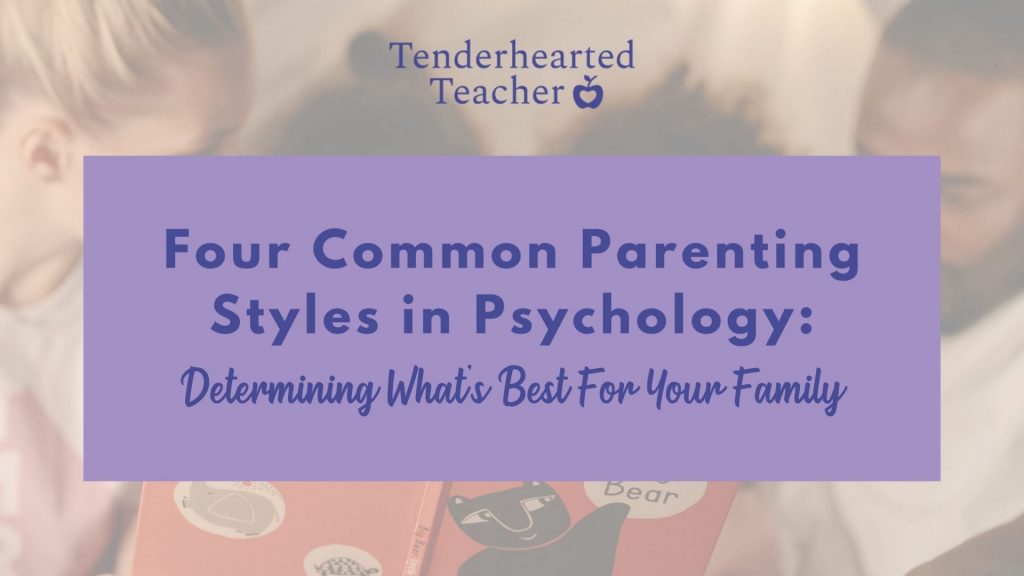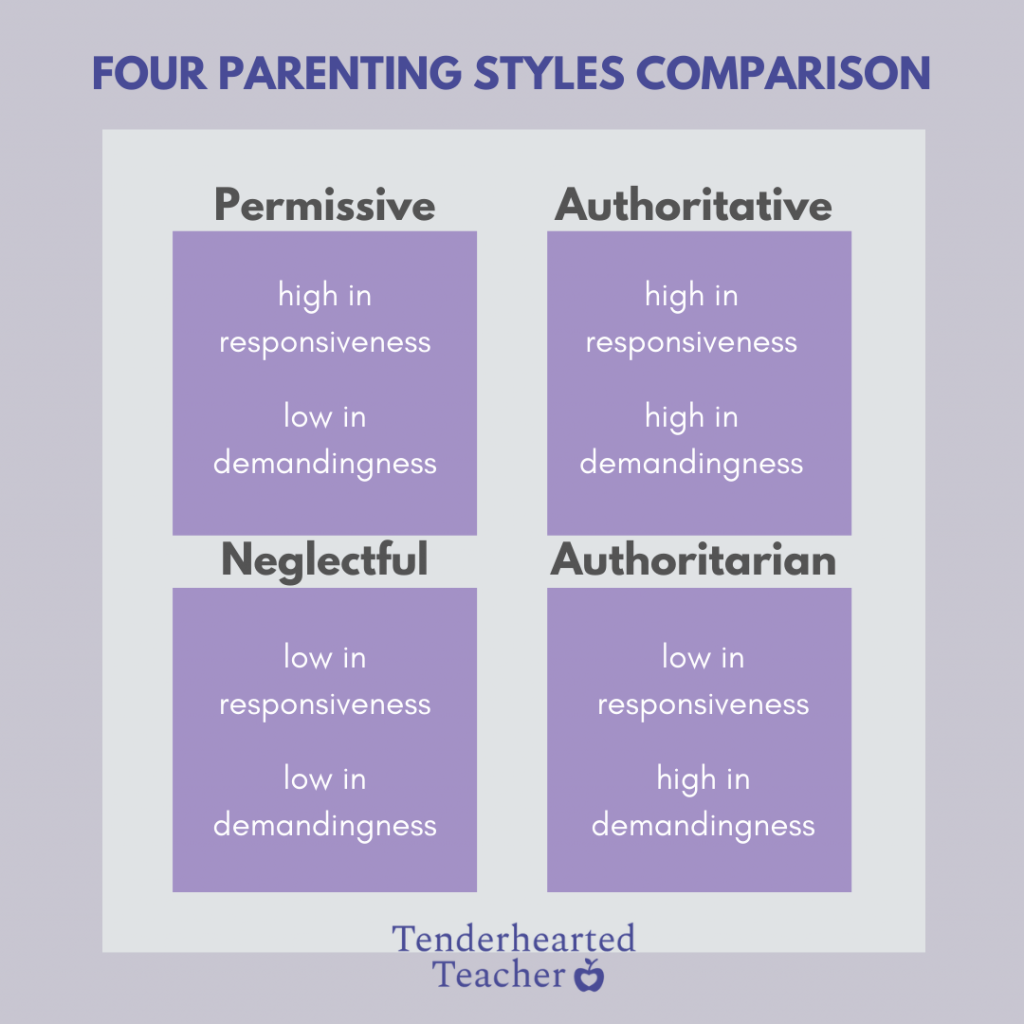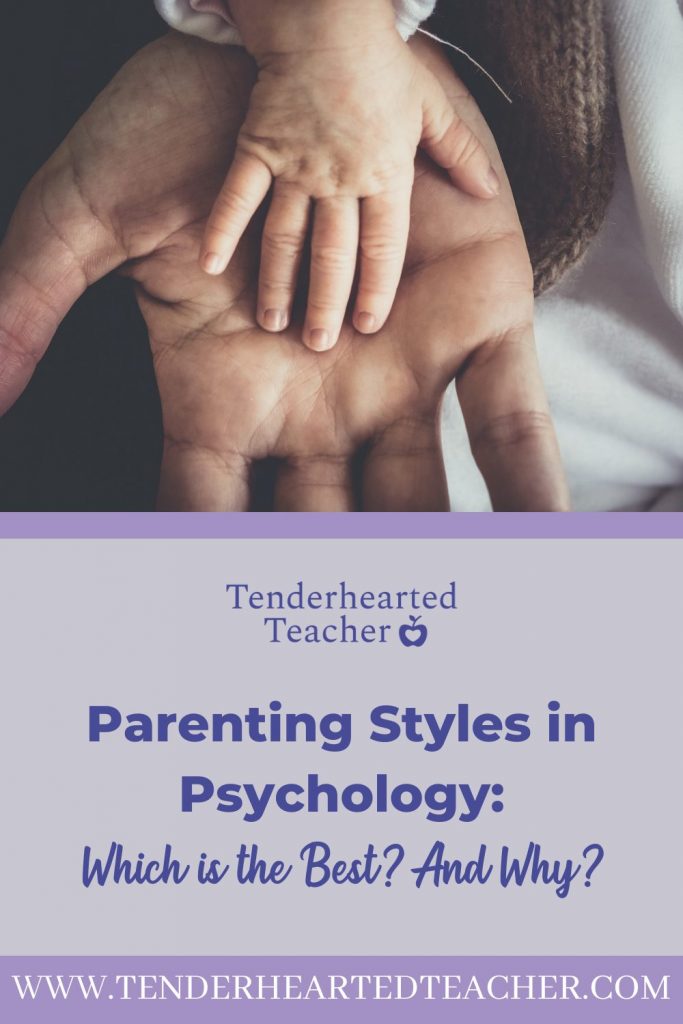
Listen, I will be the first to admit, there is a lot of noise and opinions online about how to parent. Jarring and click-bait headlines about what to do and what not to do bombard us every day. In fact, it can be a little overwhelming for overstretched parents who are just trying to do their best. That’s why I’ve created this post. It’s a brief guide to the 4 overarching parenting styles in psychology and which is best based on research. With this information, you can feel comfortable and confident in the choices you make at home with your own children and families.
4 Overarching Parenting Styles in Psychology
If you are researching parenting styles chances are you’ll come across the name, of American psychologist, Diana Baumrind. This is because her research, during the 1960s, set the stage for what we now understand to be the 4 parenting styles in psychology. She classified three distinct approaches to parenting in her initial research. These are permissive, authoritarian, and authoritative. A fourth style, neglectful, would be added by subsequent researchers Elenor Maccoby and John Martin in the 1980s.
All four of these parenting styles are based on two factors: responsiveness and demandingness. According to Britannica.com, “Parents high in responsiveness are attuned and sensitive to their children’s cues. Responsiveness also includes warmth, reciprocity, clear communication, and attachment. Parents high in demandingness monitor their children, set limits, enforce rules, use consistent and contingent discipline, and make maturity demands.”
So What Does Each Style Look Like?
The names of each style are pretty self-explanatory, but let’s get into the nitty-gritty. First, I’ll begin with a common scenario. A parent and young child are walking through a department store. The child spots a toy they want and starts to throw a tantrum when they are told they cannot have it. Here’s what each parent might say or do:
- Permissive: “Okay, you can have it, sweetie. Don’t cry. Here you go.”
- Authoritarian: “Stop crying right now or I will give you something to cry about. You’re not getting it because I said so.”
- Neglectful: Ignores the child as they continue to shop.
- Authoritative: “You want the toy and you are upset you can’t have it. We’re not getting that toy now. You have many toys like that at home. We can play with those later today.”

Permissive
The permissive parent is exactly what it sounds like. It’s one that rarely places demands or establishes rules or boundaries. They are warm and loving. However, they give children control as a way to avoid conflict. Giving in to a child’s demands may seemingly alleviate problem behaviors in the moment. But the long-term impacts of this approach tend to be negative. In fact, the American Psychological Association (APA) states “Children raised with this parenting style tend to be impulsive, rebellious, aimless, domineering, aggressive and low in self-reliance, self-control and achievement.”
Authoritarian
On the opposite side of the spectrum, we have the authoritarian parent. They are overly strict with rules and discipline. They expect compliance and blind obedience above all else. Often there is one-sided communication–dominated by the parent. Additionally, there is little regard for the child’s overall emotional well-being.
Neglectful
Parents who are neglectful neither place demands nor show responsiveness. They are aloof. They pay little attention to their child’s needs and are uninvolved in discipline or setting limits. This scenario tends to lead to the worst outcomes out of all four styles.
Authoritative
The final style is authoritative. These parents find a balance between responsiveness and demandingness. They are affectionate and empathetic. But, they are not permissive. They set developmentally and age-appropriate boundaries and expectations. Popular approaches to parenting, often referred to online, fall under this umbrella such as mindful, positive, and gentle parenting.
Which Style is Best?
First, let me state that parenting is not an exact science. No parent is perfect and no style is perfect. Additionally, there are a lot of layers as to how a person’s makes individual parenting choices such as community, social, and/or cultural factors. Therefore, no two homes will look exactly alike. With that said, research shows that the authoritative style tends to promote the best outcomes regardless of those factors.
In fact, children of authoritative parents generally have higher self-esteem and fewer behavioral problems than those whose parents used other styles. The APA states, “children raised with this style tend to be friendly, energetic, cheerful, self-reliant, self-controlled, curious, cooperative, and achievement-oriented.”
And Why?
In a recent article by CNBC, psychologist, Francyne Zeltser, explains why there’s a consensus in the field naming it the best approach. She states, “Authoritative parents allow their kids to make mistakes. This offers kids the opportunity to learn while also letting them know that their parents will be there to support them.” Furthermore, she says, “Authoritative parenting is especially helpful when dealing with conflict, because the way we learn to deal with conflict at a young age plays a big role in how we handle our losses or how resilient we are in our adult lives.”
In conclusion, authoritative parents strike the right balance. They have high standards and expectations. But, they are still responsive and empathetic to their child’s needs and overall development. Additionally, they use effective discipline strategies and aim to teach rather than to punish. They are open to communication and they allow their children to freely express their thoughts and opinions. They also find the teachable moments in life’s experiences…the good and the bad. This lays the groundwork for a collaborative and healthy environment that fosters self-regulation, positive self-esteem, and strong social-emotional skills.
Now talk to me!
What type of parenting style do you use with your child? Is it the same one that your parents/caregivers used with you? Share your comments and questions below.
Check Out More Related Content
- How to Deal with Challenging Behaviors in Preschool
- Why Social-Emotional Learning Matters (Especially in Preschool)
- Simple Ways to Teach Your Little One About Gratitude
References: Baumrind, D. (1966). Effects of Authoritative Parental Control on Child Behavior. Child Development, 37(4), 887–907. https://doi.org/10.2307/1126611
SAVE TO PINTEREST




Beautifully explained. Parenting is a journey and we learn with experience.
Thank you for explaining the different parenting styles.
Thank you for your comment. You’re absolutely right, Rancy!
I think I’m more authoritative. I definitely try to keep the peace though, while disciplining when need to. Regardless, gosh parenting is so hard! Sometimes it feels like I am doing all the things wrong.
We aim to do our best at authoritative parenting, while my husband struggles with being too authoritarian, I struggle with being too permissive.
I’m also an educator. I think most parents use a mixture of parenting styles. It’s never just black and white. It also depends on the time. In the 1970s, the “laissez-faire” style was most likely more en vogue than today. My son was raised the Montessori way, which is a form of gentle parenting, but it was also way more permissive (within a prepared environment) and child-centered than an authoritative style. I was raised in the 70s with an authoritarian style (by a demanding father and a gentle mother). It seems to have worked, because all three children got their doctorates 😉
This was a very interesting read! I aim for a authoritative parenting style, but it doesn’t always go that way. Haha
Same, Rachel! Haha. But in all seriousness, parenting styles ebb and flow. It’s just about trying to maintain a balance.